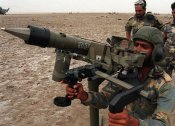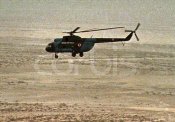
Home >> Other Ops & Incidents >> The Atlantique Kill >>
VayuSena
© Time; time.com
By Maseeh Rahman, Kutch
[August 23-30, 1999 Vol. 154 No. 7/8]
With the downing of a Pakistani military aircraft, familiar accusations fly between New Delhi and Islamabad over who provoked the latest round of tensions on the subcontinent
It seems only fitting that hostilities between India and Pakistan should break out in the most inhospitable of settings. In June, the bitter subcontinental enemies clashed in the mountainous moonscape of Kashmir's Kargil district. Now, they are threatening to do the same in the Rann of Kutch, a vast, salt-soaked wasteland by the Arabian Sea that is the last refuge of Equus hemionus, the untamable wild ass.
Lying mostly below sea level, the 20,000-sq-km badlands separate India's Gujarat state from Pakistan's Sind province. A small stretch of the Gujarat-Sind border along an estuary is already hotly disputed, resulting in the frequent arrests of each other's fishermen. The two sides have fought here twice before--in 1965 and again in 1971. Last week, there was concern that a third clash loomed after an Indian Air Force jet shot down a Pakistan Navy reconnaissance aircraft, killing the five officers and 11 men on board.
As is typical for a dispute between India and Pakistan, the two sides offered dramatically different versions of the incident. Pakistan says the French-made Atlantique--a long-range, twin-engine turboprop aircraft designed for electronic snooping, as well as anti-ship and anti-submarine warfare--was on a routine training mission. It had taken off from the Mehran naval base at 9:15 a.m. on Aug. 10 and disappeared two hours later. Part of the wreckage was discovered in the wasteland 2 km inside Pakistani territory. The downing of the aircraft was "a barbaric act," Prime Minister Mohammed Nawaz Sharif fumed at a service in Mehran honoring the dead airmen. "The aircraft was unarmed, and it had not violated Indian air space."
For its part, New Delhi insisted the plane had been hit while on the Indian side of the border on a spying mission. What's more, said the Indians, the plane had entered Indian air space on at least eight previous occasions since May, when armed intruders from Pakistan were first detected on the ground in Kargil. The aircraft had managed to slip away after the earlier incursions; this time two Indian Air Force MiG-21 jets succeeded in intercepting it 10 km inside Indian territory. When the MiGs tried to escort it to a nearby base, the Pakistani aircraft turned abruptly and headed back for the border. Some 5 km short of the border, a missile fired by one of the pursuing MiGs hit the port engine of the Atlantique. It was last sighted by Indian radar at 11:23 a.m. as it hurtled back into Pakistan territory. "No training aircraft flies so close to the border," said IAF chief Anil Tipnis. "It was a planned information-gathering mission." Tipnis' men even brought pieces of the downed aircraft for display in New Delhi; Pakistan promptly accused the Indians of stealing from the wreckage site inside Pakistani territory.

Not unlike the barren ridges of Kargil, the badlands of the Rann are suddenly bristling with weaponry and soldiers. The two sides put their forces on high alert, and fighter aircraft aggressively patrolled the skies. Pakistan airlifted a company of commandos, equipped with laser-guided, shoulder-fired, surface-to-air missiles, to the wreckage site. The men dug trenches in the soft earth, and there was talk of war. "We haven't eaten for 22 hours," said Abdul Razzak, a navy commando. "Food will come, but we will forget everything, food and water, if the fighting starts. We're ready for a war." The mood was even more ominous back at the Mehran naval base. Said a Pakistan Navy officer: "The government is acting like a eunuch. We should kill 300 Indians against our 16." An Indian MiG-21 jet and an Mi-17 helicopter were shot down in Kargil at the end of May, killing five airmen. More than two months later, the scoreboard has changed with the downing of the Atlantique. But the game may not be over yet.

Even those watching from the sidelines can be jolted by the rivalry, as a group of journalists from Indian and international media discovered last Wednesday. They were flying to a waterlogged area of the Rann, where, according to the Indian side, some of the debris from the Pakistani plane had fallen. The IAF helicopter carrying them was still 4 km from the border when it suddenly banked steeply to the left, losing height rapidly. The pilot claimed he had spotted a plume of smoke from a surface-to-air missile that had exploded, he said, about 400 m ahead. The helicopter and two others following it were ordered back to their base. Had a missile been fired by one of the angry commandos lying in wait on the Pakistani side of the border? Again, the two sides disagreed, with Pakistan insisting that the missile was fired not at the helicopter but at an Indian jet fighter, and much earlier in the day.
As temperatures rose in the waterlogged Rann, the rest of the world looked on with a mixture of alarm and resignation. The subcontinent is in a state of "continued high-stakes tension," said U.S. State Department spokesman James Rubin. Washington urged the bellicose neighbors to honor their own 1991 agreement imposing a 10-km-wide no-fly zone for combat aircraft on either side of the border. President Clinton's quiet diplomacy helped defuse the Kargil crisis last month, but the 52-year-old dispute over Kashmir continues to claim lives. In recent days, an Indian army colonel, a captain and 13 soldiers have been killed in rocket attacks by Pakistan-backed insurgents on military camps there.
To complicate matters further, India is gearing up for a general election next month. National security is an important plank for the ruling Bharatiya Janata Party, so the downing of the Pakistani aircraft will only help Prime Minister Atal Behari Vajpayee's prospects. More difficult to ascertain is the impact of the incident in Islamabad, where Nawaz Sharif faces increasing pressure from the military and rightwing radicals to exact revenge. His response to this challenge will determine what happens next on the subcontinent.
With reporting by Ghulam Hasnain/Mehran
| Other Ops and Incidents | : | Official IAF Statement + Map |
| Other Ops and Incidents | : | Pictures of the Atlantique wreckage |
| Other Ops and Incidents | : | "Pakistanís Aggression From The Air" - By Air Cmde Singh |

Comments or Questions? Contact Us
[Home] [The IAF Today] [Other Ops & Incidents] [Kargil 1999] [1980s] [1971] [1965] |
© Time |
Top |